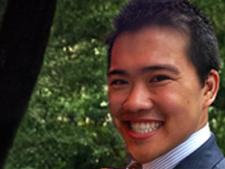About Us Menu
Mission Field - Fashion

“I’d say at best, the church ignores the fashion industry,” said Amos Chiou, graduating senior at Cornell University. “I’d say at worse, the church is the one lambasting the industry for any number of reasons—body image, sexualization, materialism, etc. It’s not that these reasons are not areas of concern, but fashion and retail are more visible in today’s culture than, for example, the legal field or medicine; thus the sins of the fashion world are unfairly magnified compared to other industries.”
After graduation, Amos Chiou, former InterVarsity chapter president at Cornell, is starting his new job post-graduation, working for Saks Fifth Avenue in New York city, where he is joining their prestigious merchant training program for future buyers and planners.
Amos didn’t expect God to lead him into the world of fashion. As a freshman, he was determined to become a lawyer and had made plans to transfer from Rutgers University to Cornell’s School of Industrial and Labor Relations because of its focus on the humanities and social sciences—great backgrounds for law school. However, by the end of his freshman year, Amos decided to pursue business instead of law school. It was during this time of transition to Cornell that Amos decided to check out InterVarsity.
Leadership Development through InterVarsity
He went to Cornell’s InterVarsity chapter already a Christian but nervous and in search of a spiritual community. In the end he connected most with the vision of Cornell’s Asian American InterVarsity chapter to renew the Asian American community at the college. After attending an Asian American InterVarsity Bible study for one semester, Amos was invited by one of his leaders to think about serving as a co–small group leader his second semester.
So over the next year, Amos learned to lead a Bible study small group with the help and coaching from his original small group leader. Over the next couple years, Amos continued to find ways to serve in his chapter—as NSO coordinator, Large group coordinator, and lastly as chapter president.
“The skills that I’ve learned from InterVarsity are so valuable,” said Amos. “I’ve gained the experience of working with and leading people, planning for unforeseen circumstances, dealing with conflict, learning better ways of communication, vision casting effectively—all things that come handy for the workplace.”
Finding His Calling: Fashion Industry
As Amos graduates this year and prepares to embark on the next chapter of his life, he goes out prepared to be a world changer in the fashion industry.
“Two years ago, Andy Stearns, a Cornell ’04 graduate and son of Richard Stearns [Cornell ’73 graduate and World Vision president] spoke at a Cornell-wide missions conference,” said Amos. “At this conference, he exhorted the participants to find our calling and our own mission statement. I see my calling as spreading the love of Christ to the luxury retail and fashion industries.”
Amos is thankful to God for the ways he’s helped him see the fashion industry as a mission field that God is sending him into.
“God has given me not only the gift of his salvation and Christ’s love, but also an appreciation for the world of fashion and retail and now a heart for all who work in it,” said Amos. “Christians are rare in this kind of industry, and as a result their influence is even rarer. I feel that God is using my interest in fashion retail, as well as my Christian faith, . . . to serve him in this new world he’s placed me in.”
Fashion: A Tool for Renewal
Amos also sees how God is already using the fashion industry to bring hope and renewal to countless people around the world. A number of ministries, for example, advocate various social justice issues through fashion, such as jewelry or clothing made by freed sex slaves.
At the same time, Amos’s heart breaks for the lack of outreach to the existing fashion and retail industry at large: the models, designers, photographers, buyers, planners, fashion editors—the very people Amos will be working with and essentially being in community with for the foreseeable future at his new job.
“Issues in the fashion industry are many, and Christians should be aware of all of them,” said Amos. “There are a very small number of minority models who walk the runways for major designers. There are also issues of social justice in the manufacture of clothing—most poignantly in the recent Bangladesh garment factory tragedy. There are issues of overt sexualization of younger and younger aged clothing, as well as less than ideal marketing techniques. These are all basic issues that plague the industry . . . but I want to have a positive, Christ-bearing impact on my coworkers and in the greater fashion/retail industry as a whole.”